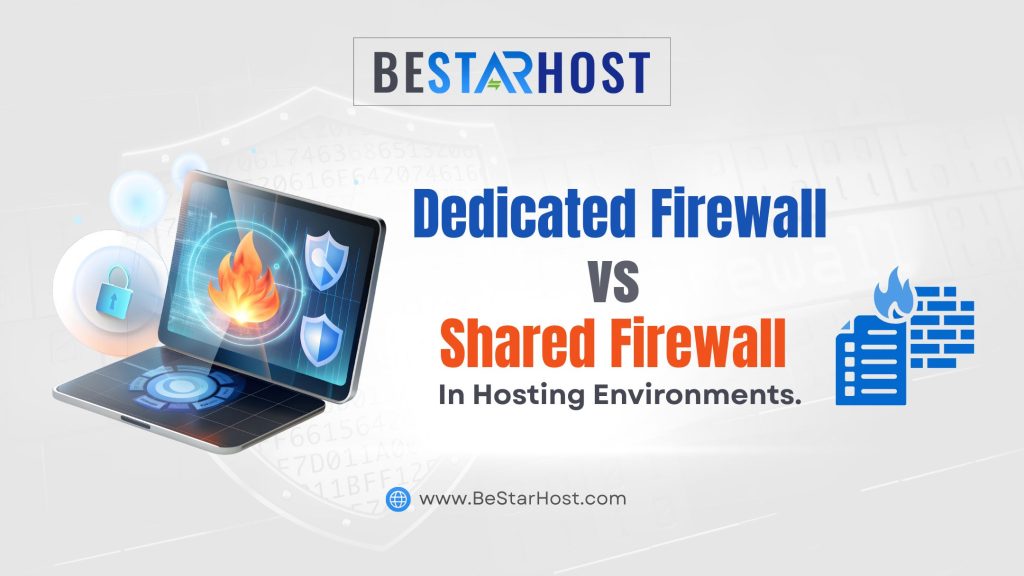
Website security isn’t optional—it’s a necessity. One of the key components of a secure hosting environment is a firewall, which acts as a barrier between your server and potential threats. But when choosing a hosting plan, you’ll often encounter two options: dedicated firewall and shared firewall.
So, what’s the difference? Which one is right for your website or business? In this guide, we’ll break down the dedicated firewall vs shared firewall debate, explore their pros and cons, and help you make the right choice for your hosting environment.
🔐 What Is a Firewall in Web Hosting?
A firewall in web hosting is a security system that monitors and controls incoming and outgoing traffic based on predefined security rules. It helps block unauthorized access, filter malicious traffic, and protect your server from threats like:
-
DDoS attacks
-
Malware and ransomware
-
SQL injection
-
Cross-site scripting (XSS)
-
Brute-force login attempts
There are two major web hosting firewall types: shared firewalls and dedicated firewalls. Let’s explore both.
🌐 What Is a Shared Firewall in Hosting?
A shared firewall is a firewall system used by multiple servers or clients hosted on the same infrastructure. It offers basic protection that applies to all users on a shared hosting plan.
✅ Pros of Shared Firewalls
-
Cost-effective: Included in most shared or VPS hosting plans at no extra cost.
-
Pre-configured: Managed and maintained by the hosting provider.
-
Good for beginners: No setup or technical knowledge required.
❌ Cons of Shared Firewalls
-
Limited customization: Rules are general and not tailored to your specific website.
-
Shared risk: If one server under attack bypasses the firewall, others may also be affected.
-
Lower performance: Limited bandwidth or inspection capabilities shared among many users.
🔒 What Is a Dedicated Firewall?
A dedicated firewall is an exclusive firewall system assigned to your server (e.g., dedicated server, private cloud, or enterprise hosting). You control the firewall settings and rules specific to your applications.
✅ Dedicated Firewall Benefits
-
Enhanced security: Custom rules, policies, and real-time monitoring tailored to your environment.
-
Isolation: You are not affected by other users’ traffic or vulnerabilities.
-
Scalability: Ideal for high-traffic sites, ecommerce platforms, or apps handling sensitive data.
-
Compliance-ready: Better suited for GDPR, HIPAA, PCI-DSS, and other regulatory frameworks.
❌ Cons of Dedicated Firewalls
-
Higher cost: Usually comes as an add-on or with premium hosting plans.
-
Requires expertise: You may need help from a sysadmin or security expert to configure and manage it.
🔍 Dedicated Firewall vs Shared Firewall: Key Differences
| Feature | Shared Firewall | Dedicated Firewall |
|---|---|---|
| Ownership | Shared among multiple users | Exclusively assigned to one user |
| Customization | Limited or none | Fully customizable |
| Security Level | Basic protection | Advanced protection |
| Performance | Shared resources | Optimized for your traffic |
| Best For | Small websites, blogs | Large businesses, ecommerce, apps |
| Cost | Usually free | Premium or additional cost |
🧠 Which One Should You Choose?
Choose Shared Firewall if:
-
You run a personal blog, small business site, or a low-risk application.
-
You’re on a tight budget and want a plug-and-play hosting solution.
-
You rely on a hosting provider for full server management.
Choose Dedicated Firewall if:
-
Your website handles sensitive customer data (e.g., ecommerce, healthcare, finance).
-
You want firewall protection for servers tailored to your applications.
-
You need to comply with data privacy regulations.
-
Your traffic volume is high and you need better control and performance.
🛡️ Firewall Protection for Servers: Why It Matters
Regardless of the type, firewalls form a critical first line of defense in securing your web hosting environment. Combined with other measures like SSL, DDoS protection, malware scanning, and regular updates, a firewall ensures:
-
Reduced risk of downtime
-
Protection of user data
-
Improved trust with customers and search engines
-
Compliance with cybersecurity standards
🚀 Final Thoughts
Understanding the differences between a dedicated firewall and a shared firewall is essential when choosing your hosting plan. If your business is growing or handles sensitive data, investing in a dedicated firewall could be the best decision for long-term security and compliance. For smaller projects or static websites, a shared firewall in hosting may suffice.
✅ Pro tip: Always ask your hosting provider what type of firewall is included and whether upgrades are available.
📌 Need Help Choosing the Right Hosting with Firewall Protection?
Explore our in-depth guide on secure hosting solutions or contact our team for personalized recommendations on web hosting firewall types that best suit your needs.
